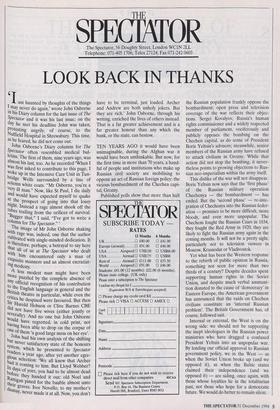The Spectator, 56 Doughty Street, London WC1N 2LL Telephone: 071-405
1706; Telex 27124; Fax 071-242 0603
LOOK BACK IN THANKS
Iam haunted by thoughts of the things I may never do again,' wrote John Osborne in his Diary column for the last issue of The Spectator and it was his last issue; on the day he met his deadline John was taken, protesting angrily, of course, to the Nuffield Hospital in Shrewsbury. This time, as he feared, he did not come out. John Osborne's Diary columns for The Spectator often resembled medical bul- letins. The first of them, nine years ago, was almost his last, too. As he recorded 'When I was first asked to contribute to this page, I Woke up in the Intensive Care Unit in Tun- bridge Wells surrounded by a line of solemn white coats. "Mr Osborne, you're a very ill man." Now, like St Paul, I die daily and would have expected myself to quake at the prospect of going into that lousy night. Instead a rage almost shook off the tubes trailing from the orifices of survival. "laugger that," I said, "I've got to write a column for The Spectator." ' The image of Mr John Osborne shaking with rage was, indeed, one that the author cultivated with single-minded dedication. It is therefore, perhaps, a betrayal to say here that all of us at The Spectator who dealt With him encountered only a man of exquisite manners and an almost excrutiat- mg Modesty. A less modest man might have been "tore puzzled by the complete absence of any official recognition of his contribution to the English language in general and the British theatre in particular, while even the critics he despised were favoured. But then Sir Harold Hobson or Clive Barnes CBE did not L have five wives (either jointly or severally). And no one but John Osborne would have regretted, in cold print, not having- been able to drop on the corpse of one of them 'a good large mess on her eye'. , John had his own analysis of the shifting but never satisfactory state of the honours system, which he presented to Spectator readers a year ago, after yet another egre- gious selection: 'We all knew that Archer had it coming to him. But Lloyd Webber? days of yore, you had to be almost dead II°_efore they handed it out: old Noel and R. attigan pined for the bauble almost unto their graves. Ivor Novello, to my mother's "lanlaY, never made it at all. Now, you don't have to be terminal, just loaded. Archer and Andrew are both unholy jokers. But they are rich.' John Osborne, through his writing, enriched the lives of others instead. That is a far greater achievement and is a far greater honour than any which the bank, or the state, can bestow.
TEN YEARS AGO it would have been unimaginable, during the Afghan war it would have been unthinkable. But now, for the first time in more than 70 years, a hand- ful of people and institutions who make up Russian civil society are mobilising to oppose an act of Russian foreign policy: the vicious bombardment of the Chechen capi- tal, Grozny.
Published polls show that more than half the Russian population frankly oppose the bombardment; open press and television coverage of the war reflects their objec- tions. Sergei Kovalyov, Russia's human rights commissioner and a widely respected member of parliament, vociferously and publicly opposes the bombing on the Chechen capital, as do some of President Boris Yeltsin's advisors; meanwhile, senior members of the Russian army have refused to attack civilians in Grozny. While that action did not stop the bombing, it never- theless points to growing objections to Rus- sian neo-imperialism within the army itself. This dislike of the war will not disappear. Boris Yeltsin now says that the 'first phase' of the Russian military operation Chechenya — the bombardment — has ended. But the 'second phase' — re-inte- gration of Chechenya into the Russian feder- ation — promises to be more difficult, more bloody, and even more unpopular. The Chechens fought the Russian Czars in 1834, they fought the Red Army in 1920, they are likely to fight the Russian army again in the corning months. It will not be a pretty sight, particularly not to television viewers in Moscow, Krasnodar or Vladivostok.
Yet what has been the Western response to the rebirth of public opinion in Russia, something not seen for more than two thirds of a century? Despite decades spent supporting human rights in the Soviet Union, and despite much verbal ammuni- tion donated to the cause of 'democracy' in Eastern Europe, the American government has announced that the raids on Chechen civilians constitute an 'internal Russian problem'. The British Government has, of course, followed suit.
Internal or external, the West is on the wrong side: we should not be supporting the inept ideologues in the Russian power ministries who have dragged a confused President Yeltsin into an unpopular war. By lending our official approval to Russian government policy, we in the West — as when the Soviet Union broke up (and we opposed it), as when the Baltic states claimed their independence (and we opposed it) — are siding, once again, with those whose loyalties lie in the totalitarian past, not those who hope for a democratic future. We would do better to remain silent.


























































 Previous page
Previous page